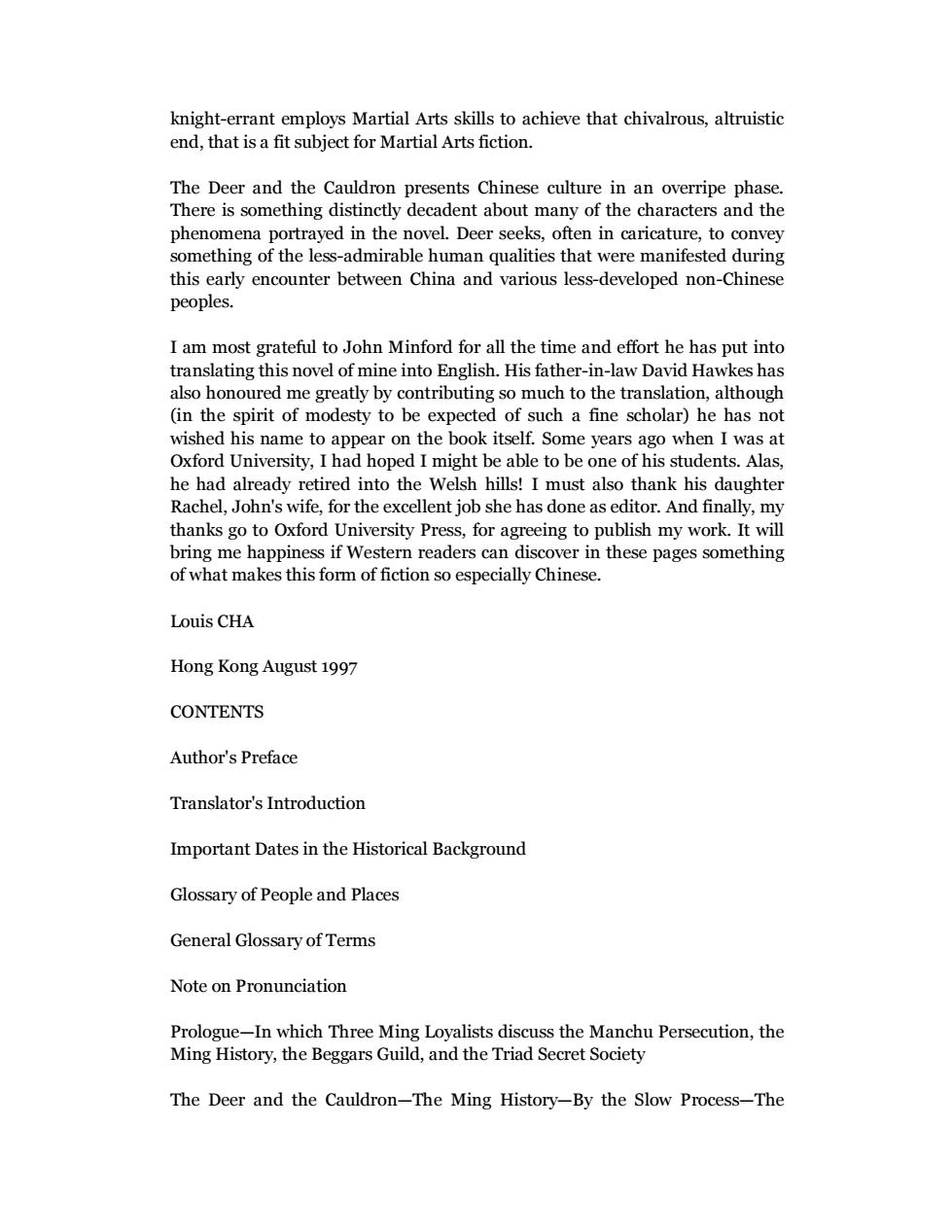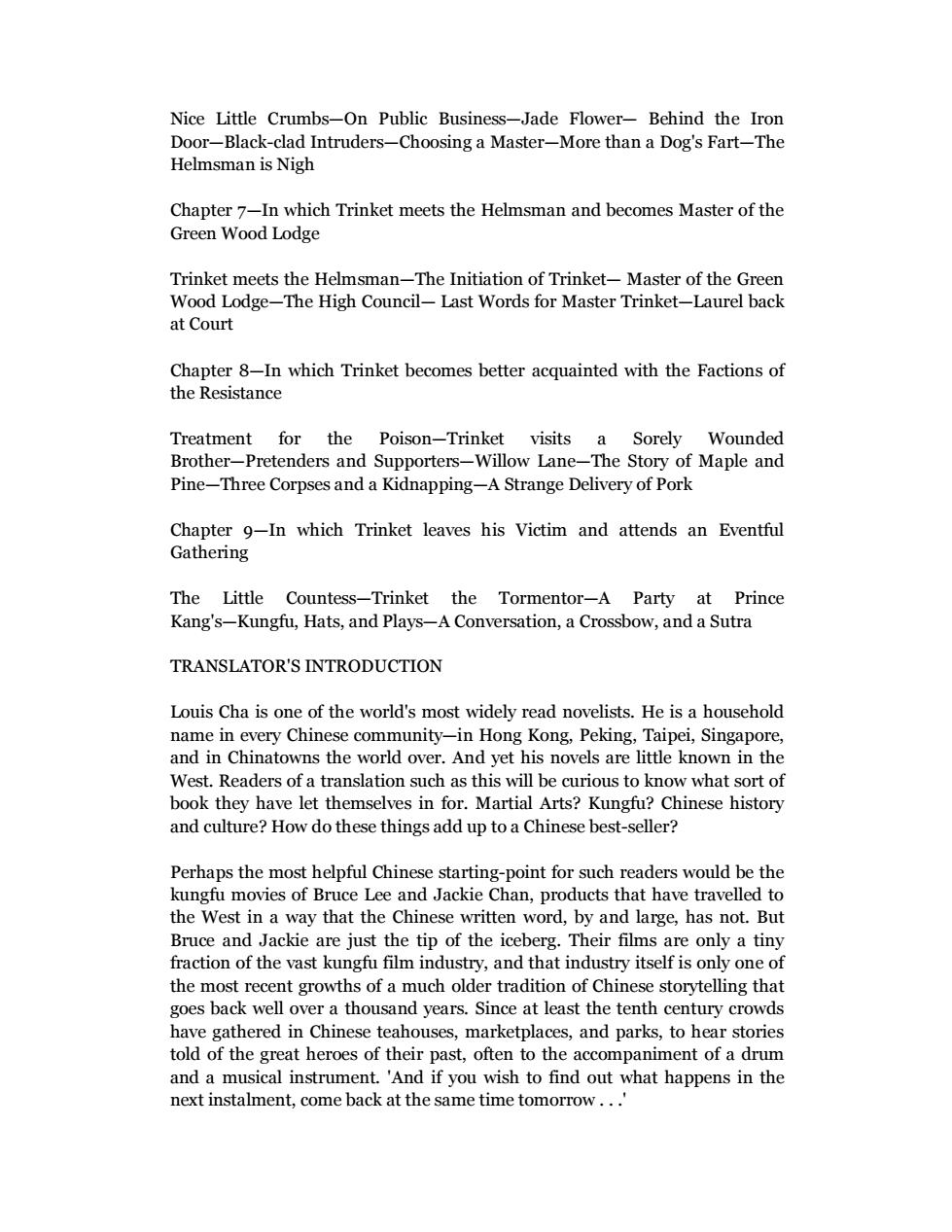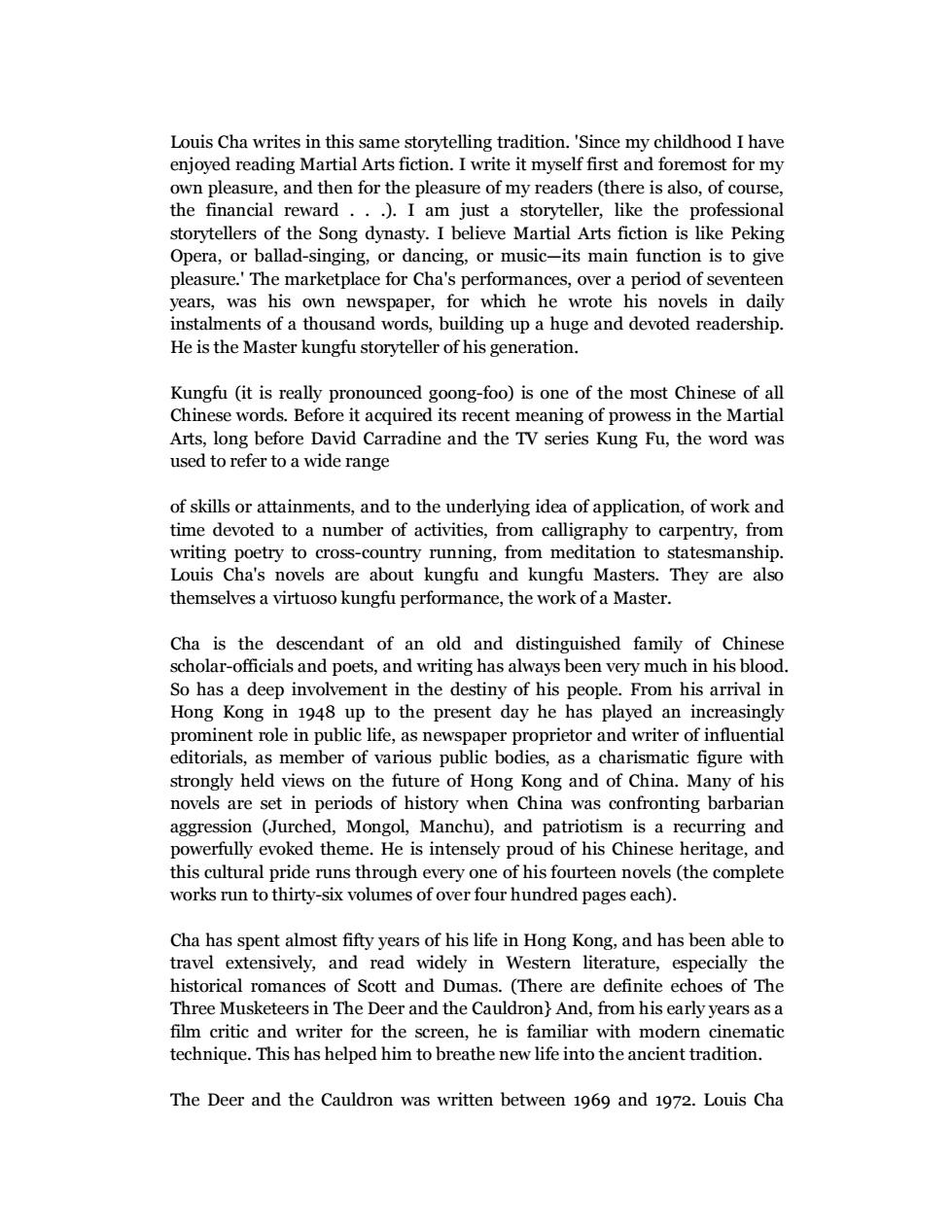
THEDEERANDTHECAULDRONThe First BookA Martial Arts novelbyLouis ChaTranslated and editedby John MinfordOXPORDUNIVERSITYPRESSOXFORDUNIVERSITYPRESSOxfordUniversityPress isadepartmentoftheUniversityofOxford.It furthers the University's objective ofexcellence in research, scholarship,and educationbypublishingworldwideinOxford New YorkAthens Auckland Bangkok Bogota Buenos Aires Calcutta Cape Town ChennaiDar es SalaamDelhi FlorenceHongKong IstanbulKarachi Kuala Lumpur Madrid Melbourne Mexico City Mumbai Nairobi ParisSao Paulo Shanghai Singapore Taipei Tokyo Toronto Warsawwith associated companies in Berlin Ibadan Oxford is a registered trade markofOxfordUniversityPressFirst published 1997This impression (lowest digit)357910864PublishedintheUnitedStatesbyOxfordUniversityPress,NewYork
THE DEER AND THE CAULDRON The First Book A Martial Arts novel by Louis Cha Translated and edited by John Minford OXPORD UNIVERSITY PRESS OXFORD UNIVERSITY PRESS Oxford University Press is a department of the University of Oxford. It furthers the University's objective of excellence in research, scholarship, and education by publishing worldwide in Oxford New York Athens Auckland Bangkok Bogota Buenos Aires Calcutta Cape Town Chennai Dar es Salaam Delhi Florence Hong Kong Istanbul Karachi Kuala Lumpur Madrid Melbourne Mexico City Mumbai Nairobi Paris Sao Paulo Shanghai Singapore Taipei Tokyo Toronto Warsaw with associated companies in Berlin Ibadan Oxford is a registered trade mark of Oxford University Press First published 1997 This impression (lowest digit) 3 5 7 9 10 8 6 4 Published in the United States by Oxford University Press, New York

knight-errant employs Martial Arts skills to achieve that chivalrous, altruisticend,that is a fit subject for Martial Arts fiction.The Deer and the Cauldron presents Chinese culture in an overripe phase.There is something distinctly decadent about many of the characters and thephenomena portrayed in the novel. Deer seeks, often in caricature, to conveysomething of the less-admirable human qualities that were manifested duringthis early encounter between China and various less-developed non-Chinesepeoples.I am most grateful to John Minford for all the time and effort he has put intotranslating this novel of mine into English. His father-in-law David Hawkes hasalso honoured me greatly by contributing so much to thetranslation, although(in the spirit of modesty to be expected of such a fine scholar) he has notwished his name to appear on the book itself. Some years ago when I was atOxford University, I had hoped I might be able to be one of his students. Alashe had already retired into the Welsh hills! I must also thank his daughterRachel, John's wife,for the excellent job she has done as editor. And finally,mythanks go to Oxford University Press, for agreeing to publish my work, It willbring me happiness if Western readers can discover in these pages somethingof what makes this form of fiction so especially Chinese.LouisCHAHong Kong August 1997CONTENTSAuthor'sPrefaceTranslator's IntroductionImportant Dates in the Historical BackgroundGlossaryof Peopleand PlacesGeneralGlossaryofTermsNote on PronunciationPrologue-In which Three Ming Loyalists discuss the Manchu Persecution, theMing History, the Beggars Guild, and the Triad Secret SocietyThe Deer and the Cauldron-The Ming History-By the Slow Process-The
knight-errant employs Martial Arts skills to achieve that chivalrous, altruistic end, that is a fit subject for Martial Arts fiction. The Deer and the Cauldron presents Chinese culture in an overripe phase. There is something distinctly decadent about many of the characters and the phenomena portrayed in the novel. Deer seeks, often in caricature, to convey something of the less-admirable human qualities that were manifested during this early encounter between China and various less-developed non-Chinese peoples. I am most grateful to John Minford for all the time and effort he has put into translating this novel of mine into English. His father-in-law David Hawkes has also honoured me greatly by contributing so much to the translation, although (in the spirit of modesty to be expected of such a fine scholar) he has not wished his name to appear on the book itself. Some years ago when I was at Oxford University, I had hoped I might be able to be one of his students. Alas, he had already retired into the Welsh hills! I must also thank his daughter Rachel, John's wife, for the excellent job she has done as editor. And finally, my thanks go to Oxford University Press, for agreeing to publish my work. It will bring me happiness if Western readers can discover in these pages something of what makes this form of fiction so especially Chinese. Louis CHA Hong Kong August 1997 CONTENTS Author's Preface Translator's Introduction Important Dates in the Historical Background Glossary of People and Places General Glossary of Terms Note on Pronunciation Prologue—In which Three Ming Loyalists discuss the Manchu Persecution, the Ming History, the Beggars Guild, and the Triad Secret Society The Deer and the Cauldron—The Ming History—By the Slow Process—The

Beggar inthe Snow-Beggars andTriads-The Scholarin theDoorwayChapter 1-In which Trinket and Whiskers set out from Yangzhou for theCapital; of their Adventures on the Way; and of the Stories Trinket tellsconcerning the Golden Age, Heroes and Mongols, Turtles, Elephants, and MiceYangzhou, City of Pleasure-Trinket and Whiskers become acquainted on theRoad toVictoryHill-GoateeWuandBaldyWang-TheTroopersArrive-Trinket on Horseback-The Satrap's Men-Whiskers the Would-beMaster-Trinket the StorytellerChapter 2-In which Whiskers and Trinket reach Peking, and encounter aQueerOldEunuchWresders and Eunuchs-Whiskers, Trinket, and Hai Goong-goong-A Drug,aDagger, and a Getaway-A Corpse, a Chamber-pot, a Suit of Clothes, anUnusual Powder, and Pus-The Dice are Loaded-Donkeys-PatisseriePekinoiseChapter3-FurtherAdventuresofTrinketintheCapitalA Sparring Partner-Trinket is Asked to Steal a Sutra-Foolproof Moves-Liveor Die!-TrinketTakesa Lesson inKungfu-Stork and Monkey-TheArcher-Tamardy!-Short Cuts-Trinket makes a Deal-The Upper Library-TheImperial GuardianChapter 4-Trinket the EunuchA Loyal and Devoted Subject-The Secret is Out- Punting the BoatDownstream-MercifulGuanyinofaThousandHands-EightTrigramsoftheRoving Dragon-Oboi against the Odds-The Aftermath- The EmpressDowager-A Weird Old Fellow-Oboi's Mansion:Sworn Brothers-AnInventory, a Sword, and a Waistcoat-BlossomChapter 5-Inwhich Trinketbecomes more deeply embroiled in PalaceIntrigueOf Soup and Poison, and Other Things-Trinket keeps an Assignation-TheOld Devil and the Old Whore-Mortal Combat-Not a Healdiy Place to BeChapter 6-In which Trinket is promoted; Oboi is killed; and Trinketeavesdropsona StruggleforSuccession
Beggar in the Snow—Beggars and Triads—The Scholar in the Doorway Chapter 1—In which Trinket and Whiskers set out from Yangzhou for the Capital; of their Adventures on the Way; and of the Stories Trinket tells concerning the Golden Age, Heroes and Mongols, Turtles, Elephants, and Mice Yangzhou, City of Pleasure—Trinket and Whiskers become acquainted on the Road to Victory Hill—Goatee Wu and Baldy Wang—The Troopers Arrive—Trinket on Horseback—The Satrap's Men—Whiskers the Would-be Master—Trinket the Storyteller Chapter 2—In which Whiskers and Trinket reach Peking, and encounter a Queer Old Eunuch Wresders and Eunuchs—Whiskers, Trinket, and Hai Goong-goong—A Drug, a Dagger, and a Getaway—A Corpse, a Chamber-pot, a Suit of Clothes, an Unusual Powder, and Pus—The Dice are Loaded—Donkeys— Patisserie Pekinoise Chapter 3—Further Adventures of Trinket in the Capital A Sparring Partner—Trinket is Asked to Steal a Sutra— Foolproof Moves—Live or Die!—Trinket Takes a Lesson in Kungfu—Stork and Monkey—The Archer— Tamardy!—Short Cuts—Trinket makes a Deal—The Upper Library—The Imperial Guardian Chapter 4—Trinket the Eunuch A Loyal and Devoted Subject—The Secret is Out— Punting the Boat Downstream—Merciful Guanyin of a Thousand Hands—Eight Trigrams of the Roving Dragon—Oboi against the Odds—The Aftermath— The Empress Dowager—A Weird Old Fellow—Oboi's Mansion: Sworn Brothers—An Inventory, a Sword, and a Waistcoat—Blossom Chapter 5—In which Trinket becomes more deeply embroiled in Palace Intrigue Of Soup and Poison, and Other Things—Trinket keeps an Assignation—The Old Devil and the Old Whore—Mortal Combat—Not a Healdiy Place to Be Chapter 6—In which Trinket is promoted; Oboi is killed; and Trinket eavesdrops on a Struggle for Succession

Nice Little Crumbs-On Public Business-Jade Flower- Behind the IronDoor-Black-clad Intruders-Choosing a Master-More than a Dog's Fart-TheHelmsman is NighChapter 7-In which Trinket meets the Helmsman and becomes Master of theGreen Wood LodgeTrinket meets the Helmsman-The Initiation of Trinket-Master of the GreenWood Lodge-The High Council- Last Words for Master Trinket-Laurel backat CourtChapter 8-In which Trinket becomes better acquainted with the Factions oftheResistanceTreatmentforthePoison-TrinketvisitsaSorelyWoundedBrother-Pretenders and Supporters-Willow Lane-The Story of Maple andPine-Three Corpses and a Kidnapping-A Strange Delivery of PorkChapter 9-In which Trinket leaves his Victim and attends an EventfulGatheringTheLittleCountess-TrinkettheTormentor-AParty atPrinceKang's-Kungfu, Hats, and Plays-A Conversation, a Crossbow, and a SutraTRANSLATOR'SINTRODUCTIONLouisChais oneof theworld'smostwidelyread novelists.Heisahouseholdname in every Chinese community-in Hong Kong,Peking, Taipei, Singapore,and in Chinatowns the world over. And yet his novels are little known in theWest.Readersofatranslationsuchasthiswillbecurioustoknowwhatsortofbooktheyhave let themselves in for.Martial Arts?Kungfu?Chinese historyand culture? How do these things add up to a Chinese best-seller?Perhaps the most helpful Chinese starting-point for such readers would be thekungfumoviesofBruceLeeandJackieChan,productsthathavetravelledtothe West in a way that the Chinese written word, by and large, has not. ButBruce and Jackie are just the tip of the iceberg. Their films are only a tinyfraction of the vast kungfu film industry, and that industry itself is only one ofthe most recent growths of a much older tradition of Chinese storytelling thatgoes back well over a thousand years. Since at least the tenth century crowdshavegatheredinChineseteahouses,marketplaces,andparks,tohearstoriestold of the great heroes of their past, often to the accompaniment of a drumand a musical instrument. 'And if you wish to find out what happens in thenext instalment, comeback at the sametime tomorrow
Nice Little Crumbs—On Public Business—Jade Flower— Behind the Iron Door—Black-clad Intruders—Choosing a Master—More than a Dog's Fart—The Helmsman is Nigh Chapter 7—In which Trinket meets the Helmsman and becomes Master of the Green Wood Lodge Trinket meets the Helmsman—The Initiation of Trinket— Master of the Green Wood Lodge—The High Council— Last Words for Master Trinket—Laurel back at Court Chapter 8—In which Trinket becomes better acquainted with the Factions of the Resistance Treatment for the Poison—Trinket visits a Sorely Wounded Brother—Pretenders and Supporters—Willow Lane—The Story of Maple and Pine—Three Corpses and a Kidnapping—A Strange Delivery of Pork Chapter 9—In which Trinket leaves his Victim and attends an Eventful Gathering The Little Countess—Trinket the Tormentor—A Party at Prince Kang's—Kungfu, Hats, and Plays—A Conversation, a Crossbow, and a Sutra TRANSLATOR'S INTRODUCTION Louis Cha is one of the world's most widely read novelists. He is a household name in every Chinese community—in Hong Kong, Peking, Taipei, Singapore, and in Chinatowns the world over. And yet his novels are little known in the West. Readers of a translation such as this will be curious to know what sort of book they have let themselves in for. Martial Arts? Kungfu? Chinese history and culture? How do these things add up to a Chinese best-seller? Perhaps the most helpful Chinese starting-point for such readers would be the kungfu movies of Bruce Lee and Jackie Chan, products that have travelled to the West in a way that the Chinese written word, by and large, has not. But Bruce and Jackie are just the tip of the iceberg. Their films are only a tiny fraction of the vast kungfu film industry, and that industry itself is only one of the most recent growths of a much older tradition of Chinese storytelling that goes back well over a thousand years. Since at least the tenth century crowds have gathered in Chinese teahouses, marketplaces, and parks, to hear stories told of the great heroes of their past, often to the accompaniment of a drum and a musical instrument. 'And if you wish to find out what happens in the next instalment, come back at the same time tomorrow . .

Louis Cha writes in this same storytelling tradition. 'Since my childhood I haveenjoyed reading Martial Arts fiction. I write it myself first and foremost for myown pleasure, and then for the pleasure ofmy readers (there is also, of course,the financial reward . . .). I am just a storyteller, like the professionalstorytellers of the Song dynasty. I believe Martial Arts fiction is like PekingOpera, or ballad-singing, or dancing, or music-its main function is to givepleasure.The marketplace for Cha's performances, over a period of seventeenyears, was his own newspaper, for which he wrote his novels in dailyinstalments of a thousand words, building up a huge and devoted readershipHeisthe Masterkungfu storyteller of his generation.Kungfu (it is really pronounced goong-foo) is one of the most Chinese of allChinese words.Before it acquired its recent meaning of prowess in the MartialArts, long before David Carradine and the TV series Kung Fu, the word wasusedtoreferto a widerangeof skills or attainments, and to the underlying idea of application, of work andtime devoted to a number of activities, from calligraphy to carpentry, fromwriting poetry to cross-country running, from meditation to statesmanship.Louis Cha's novels are about kungfu and kungfu Masters. They are alsothemselves a virtuoso kungfu performance, the work of a Master.Cha is the descendant of an old and distinguished family of Chinesescholar-officials and poets, and writing has always been very much in his blood.So has a deep involvement in the destiny of his people. From his arrival inHong Kong in 1948 up to the present day he has played an increasinglyprominent role in public life, as newspaper proprietor and writer of influentialeditorials, as member of various public bodies, as a charismatic figure withstrongly held views on the future of Hong Kong and of China.Many of hisnovels are set in periods of history when China was confrontingbarbarianaggression (Jurched, Mongol, Manchu), and patriotism is a recurring andpowerfully evoked theme. He is intensely proud of his Chinese heritage, andthis cultural pride runs through every one of his fourteen novels (the completeworks run to thirty-six volumes of over four hundred pages each).Cha has spent almost fifty years of his life in Hong Kong, and has been able totravel extensively, and read widely in Western literature, especially thehistoricalromancesof Scottand Dumas.(Therearedefinite echoesof TheThree Musketeers in The Deer and the Cauldron) And, from his early years as afilm critic and writer for the screen, he is familiar with modern cinematictechnique.Thishas helped him to breathe new life into the ancient tradition.The Deer and the Cauldron was written between 1969 and 1972. Louis Cha
Louis Cha writes in this same storytelling tradition. 'Since my childhood I have enjoyed reading Martial Arts fiction. I write it myself first and foremost for my own pleasure, and then for the pleasure of my readers (there is also, of course, the financial reward . . .). I am just a storyteller, like the professional storytellers of the Song dynasty. I believe Martial Arts fiction is like Peking Opera, or ballad-singing, or dancing, or music—its main function is to give pleasure.' The marketplace for Cha's performances, over a period of seventeen years, was his own newspaper, for which he wrote his novels in daily instalments of a thousand words, building up a huge and devoted readership. He is the Master kungfu storyteller of his generation. Kungfu (it is really pronounced goong-foo) is one of the most Chinese of all Chinese words. Before it acquired its recent meaning of prowess in the Martial Arts, long before David Carradine and the TV series Kung Fu, the word was used to refer to a wide range of skills or attainments, and to the underlying idea of application, of work and time devoted to a number of activities, from calligraphy to carpentry, from writing poetry to cross-country running, from meditation to statesmanship. Louis Cha's novels are about kungfu and kungfu Masters. They are also themselves a virtuoso kungfu performance, the work of a Master. Cha is the descendant of an old and distinguished family of Chinese scholar-officials and poets, and writing has always been very much in his blood. So has a deep involvement in the destiny of his people. From his arrival in Hong Kong in 1948 up to the present day he has played an increasingly prominent role in public life, as newspaper proprietor and writer of influential editorials, as member of various public bodies, as a charismatic figure with strongly held views on the future of Hong Kong and of China. Many of his novels are set in periods of history when China was confronting barbarian aggression (Jurched, Mongol, Manchu), and patriotism is a recurring and powerfully evoked theme. He is intensely proud of his Chinese heritage, and this cultural pride runs through every one of his fourteen novels (the complete works run to thirty-six volumes of over four hundred pages each). Cha has spent almost fifty years of his life in Hong Kong, and has been able to travel extensively, and read widely in Western literature, especially the historical romances of Scott and Dumas. (There are definite echoes of The Three Musketeers in The Deer and the Cauldron} And, from his early years as a film critic and writer for the screen, he is familiar with modern cinematic technique. This has helped him to breathe new life into the ancient tradition. The Deer and the Cauldron was written between 1969 and 1972. Louis Cha